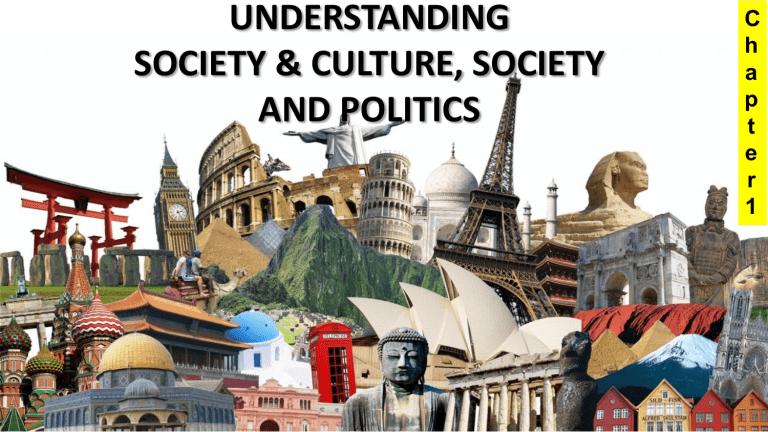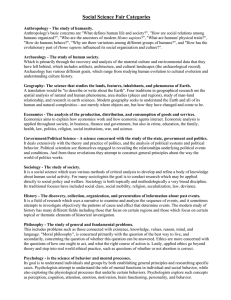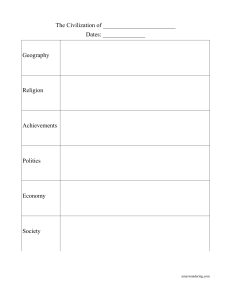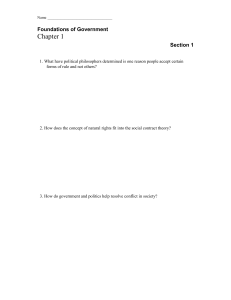
UNDERSTANDING SOCIETY & CULTURE, SOCIETY AND POLITICS C h a p t e r 1 Slide Title MAN’S SOCIAL AND CULTURAL BACKGROUND A NATION-STATE is a sovereign state whose citizens or subjects have a common culture. They speak the same language, have a common descent, and share a common history. Thus, having citizens with common culture, nationstate is a major component of one’s personal identity. PERSONAL IDENTITY- According to Beleña (2016), this is the concept you develop about yourself that evolves over the course of your life. Our personal identity is both cultural and political which is guided by our personal encounters or experiences. As defined by Edward b. Tylor, CULTURE refers to that complex whole which includes knowledge, beliefs, arts, morals, laws, customs, and any other capabilities and habits acquired by man as a member of society. KNOWLEDGE BELIEFS MORALS CULTURE ARTS CUSTOMS LAWS SIGNIFICANCE OF STUDYING CULTURE, SOCIETY AND POLITICS ADAPTATION & INTEGRATION HUMAN SATISFACTION CULTURE PRODUCTION OF MANMADE THINGS PATTERNS OF ACCEPTABLE SOCIAL BEHAVIOR CONVEYS & FACILITATES MEANING CULTURE ADAPTATION & INTEGRATION 1. Culture makes it possible for man to adapt and integrate himself to his environment by being creative and resourceful in coming up with ways and means of survival. CULTURE PATTERNS OF ACCEPTABLE SOCIAL BEHAVIOR 2. Culture establishes patterns of acceptable social behavior such as etiquette, protocols, good manners and right conduct, roles and duties, etc. As established by folkways, mores, and laws. CULTURE CONVEYS & FACILITATES MEANING 3. Culture conveys and facilitates meanings through verbal and non-verbal communication, written and non-written language, forms of expression, and symbolisms. CULTURE PRODUCTION OF MANMADE THINGS 4. Culture produces man-made things such as clothing, tools, instruments, machines, equipment, structures, etc. Made possible by technological know-how. CULTURE HUMAN SATISFACTION 5. Culture contributes to overall human satisfaction as we develop ways to make life more comfortable, easier, and more rewarding such as recreational activities, leisure, entertainment and arts, etc. CULTURE Therefore, culture creates the identity of individuals which are distinct from one another. Geographical or territorial boundaries contribute to cultural diversities of human society. SOCIETY -As individuals continued to interact, societies were formed. -Society is defined as the product of human social processes intended to meet basic needs for survival -Every society is organized in such a way that there are rules of conduct, customs, traditions, folkways, and mores, and expectations that ensure appropriate behavior among members. SOCIETY It symbolizes the groups within which human beings can live a total common life – the peer groups; social organizations like the family and kinship groups; economic, political, religious and educational groups; and communities SOCIETY REPRESENTATION OF OUR IDENTITY AVENUE FOR ECONOMIC INTERDEPENDENCE SIGNIFICANCE OF STUDYING SOCIETY SYMBOL OF POLITICAL INDEPENDENCE CHARACTERIZE THE TOTALITY OF A TERRITORY POLITICS SIGNIFICANCE OF STUDYING POLITICS: CONCENSUS AND COMPROMISE SOCIETY ACADEMICS POLITICS PUBLIC AFFAIR ART OF GOVERNMET According to Ricardo Lazo POWER AND DISTRIBUTION OF RESOURCES POLITICS According to Baleña (2016), the following are the basic definitions of politics: - People associates politics with power. - This is formed by the relationship with other people. - This is also defined as a struggle between the powerful and powerless; the haves and the have-nots. POLITICS On the other hand, Lazo (as cited by Baleña, 2016) defines the view of politics and shows the wide ranging ideas about politics which may affect the everyday lives of each individual in asociety. Politics talks about the decisions of individuals which are made collectively based on defined rules of society. These rules bind people together to preserve culture and improve human life. THE RATIONALE OF STUDYING ANTHROPOLOGY, POLITICAL SCIENCE, AND SOCIOLOGY ANTHROPOS – MEANING MAN LOGOS – MEANING SCIENCE OR STUDY According to Palispis (2007, ANTHROPOLOGY is the branch of knowledge which deals with the scientific study of man, his works, his body, his behavior and values, in time and space. It also includes man’s physical, social, and cultural development that describes and explains the phenomenon of human life. Anthropology includes man’s physical, cultural and social development which explains and describes the phenomenon of human life. Anthropology as a subject is very important in seeking answers about man’s existence and his own social experiences (Baleña, 2016). a. Anthropology helps the individuals in providing insights into aspects of past that are strange or difficult to comprehend. b. These strange aspects include conflict and violence, the trial by ordeal, superstitions and witchcraft, fashion, myths and legends and others (Banaag, 2012). c. Anthropology gives people information concerning man’s behavior in relation to his social environment. Baleña (2016) summarized the following rationale of studying political science and its definitions: a. It refers to the systematic study of a state and its government which includes the relationships of men to his/her community, relationship of men and women to the state itself, and with the relationship of state with other sovereign states abroad. b. It emphasizes the usage of power, influence, interest and diplomacy which are very important aspects in creating a well-ordered society. According to Ricardo Lazo, the goal of Political Science is citizenship education. This requires the students to appreciate and understand the duties and obligations of being a member of their own society. IMPORTANCE OF POLITICAL SCIENCE KNOWLEDGE BASED It provides the students the knowledge and understanding of a governmment, with all its component curricula like public law, political theory public administration. COMPETENCE BASED Inculcates the objectives and underlying principles of the state that should be abided by the officials snd its citizens. SKILLS BASED Prepares the students for future career path, be it in legal profession, government service, politics, teaching, and many more. SOCIOLOGY According to Joseph Fichter, SOCIOLOGY is the scientific study of patterned, shared human behavior. It analyzes human interaction and focuses on the all kinds of social interactions: social arts, social relationships, social organization, social structures, and social processes. SOCIAL ARTS SOCIAL PROCESSES SOCIAL STRUCTURES SOCIAL RELATIONSHIP SOCIAL INTERACTION SOCIAL ORGANIZATION





